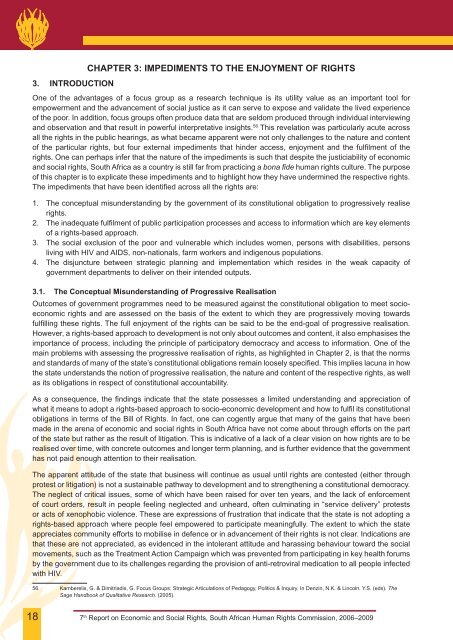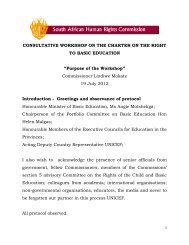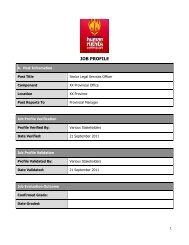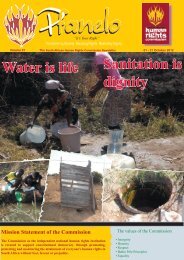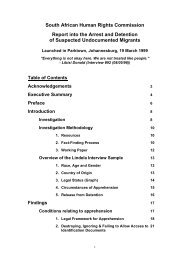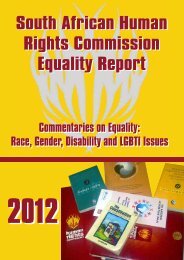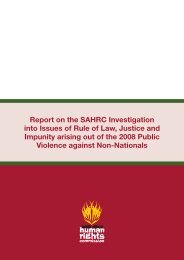Chapter 1 - South African Human Rights Commission
Chapter 1 - South African Human Rights Commission
Chapter 1 - South African Human Rights Commission
- No tags were found...
You also want an ePaper? Increase the reach of your titles
YUMPU automatically turns print PDFs into web optimized ePapers that Google loves.
3. INTRODUCTION<br />
CHAPTER 3: IMPEDIMENTS TO THE ENJOYMENT OF RIGHTS<br />
One of the advantages of a focus group as a research technique is its utility value as an important tool for<br />
empowerment and the advancement of social justice as it can serve to expose and validate the lived experience<br />
of the poor. In addition, focus groups often produce data that are seldom produced through individual interviewing<br />
and observation and that result in powerful interpretative insights. 56 This revelation was particularly acute across<br />
all the rights in the public hearings, as what became apparent were not only challenges to the nature and content<br />
of the particular rights, but four external impediments that hinder access, enjoyment and the ful lment of the<br />
rights. One can perhaps infer that the nature of the impediments is such that despite the justiciability of economic<br />
and social rights, <strong>South</strong> Africa as a country is still far from practicing a bona de human rights culture. The purpose<br />
of this chapter is to explicate these impediments and to highlight how they have undermined the respective rights.<br />
The impediments that have been identi ed across all the rights are:<br />
1. The conceptual misunderstanding by the government of its constitutional obligation to progressively realise<br />
rights.<br />
2. The inadequate ful lment of public participation processes and access to information which are key elements<br />
of a rights-based approach.<br />
3. The social exclusion of the poor and vulnerable which includes women, persons with disabilities, persons<br />
living with HIV and AIDS, non-nationals, farm workers and indigenous populations.<br />
4. The disjuncture between strategic planning and implementation which resides in the weak capacity of<br />
government departments to deliver on their intended outputs.<br />
3.1. The Conceptual Misunderstanding of Progressive Realisation<br />
Outcomes of government programmes need to be measured against the constitutional obligation to meet socioeconomic<br />
rights and are assessed on the basis of the extent to which they are progressively moving towards<br />
ful lling these rights. The full enjoyment of the rights can be said to be the end-goal of progressive realisation.<br />
However, a rights-based approach to development is not only about outcomes and content, it also emphasises the<br />
importance of process, including the principle of participatory democracy and access to information. One of the<br />
main problems with assessing the progressive realisation of rights, as highlighted in <strong>Chapter</strong> 2, is that the norms<br />
and standards of many of the state’s constitutional obligations remain loosely speci ed. This implies lacuna in how<br />
the state understands the notion of progressive realisation, the nature and content of the respective rights, as well<br />
as its obligations in respect of constitutional accountability.<br />
As a consequence, the ndings indicate that the state possesses a limited understanding and appreciation of<br />
what it means to adopt a rights-based approach to socio-economic development and how to ful l its constitutional<br />
obligations in terms of the Bill of <strong>Rights</strong>. In fact, one can cogently argue that many of the gains that have been<br />
made in the arena of economic and social rights in <strong>South</strong> Africa have not come about through efforts on the part<br />
of the state but rather as the result of litigation. This is indicative of a lack of a clear vision on how rights are to be<br />
realised over time, with concrete outcomes and longer term planning, and is further evidence that the government<br />
has not paid enough attention to their realisation.<br />
The apparent attitude of the state that business will continue as usual until rights are contested (either through<br />
protest or litigation) is not a sustainable pathway to development and to strengthening a constitutional democracy.<br />
The neglect of critical issues, some of which have been raised for over ten years, and the lack of enforcement<br />
of court orders, result in people feeling neglected and unheard, often culminating in “service delivery” protests<br />
or acts of xenophobic violence. These are expressions of frustration that indicate that the state is not adopting a<br />
rights-based approach where people feel empowered to participate meaningfully. The extent to which the state<br />
appreciates community efforts to mobilise in defence or in advancement of their rights is not clear. Indications are<br />
that these are not appreciated, as evidenced in the intolerant attitude and harassing behaviour toward the social<br />
movements, such as the Treatment Action Campaign which was prevented from participating in key health forums<br />
by the government due to its challenges regarding the provision of anti-retroviral medication to all people infected<br />
with HIV.<br />
56 Kamberelis, G. & Dimitriadis, G. Focus Groups: Strategic Articulations of Pedagogy, Politics & Inquiry. In Denzin, N.K. & Lincoln. Y.S. (eds). The<br />
Sage Handbook of Qualitative Research. (2005).<br />
18<br />
7 th Report on Economic and Social <strong>Rights</strong>, <strong>South</strong> <strong>African</strong> <strong>Human</strong> <strong>Rights</strong> <strong>Commission</strong>, 2006–2009


